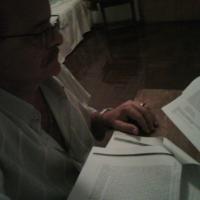讯息: 82
语言: English
sudanglo (显示个人资料) 2015年4月2日上午10:42:05
What was it, in the mood of times then, that is absent today?
Could the current climate of self-censorship of expression of the differences between populations in fact be inimical to the idea of Esperanto?
Esperanto is not primarily a vehicle for the dismantling of cultural barriers, but a provision of a neutral space in which peoples of different cultures may inter-communicate with no threat to their identity.
Is the perception of a requirement for such a neutral space diminished when we can't talk freely about difference, or when the reality of cultural barriers is not admitted?
sudanglo (显示个人资料) 2015年4月2日上午10:56:25
kaŝperanto (显示个人资料) 2015年4月2日下午12:55:43
sudanglo:At the end of the day, it seems to me valuable to understand why there was so much enthusiasm for Esperanto in the early days, and at a time when arguably the language wasn't even yet sufficiently developed to wholeheartedly adopt its role. (They had nothing then comparable to NPIV, or PMEG.)I think the actual issue here is more of culture and politics. Back in the day we were trying out all kinds of idealistic things, and since it was new there was no reason not to hope for the most out of Esperanto. Now we're quite calloused against most kinds of idealistic notions for society/government, because we have seen them fail miserably. The need is also not as pronounced among the first world superpowers, because English appears to be here to stay as an IAL.
What was it, in the mood of times then, that is absent today?
Could the current climate of self-censorship of expression of the differences between populations in fact be inimical to the idea of Esperanto?
Esperanto is not primarily a vehicle for the dismantling of cultural barriers, but a provision of a neutral space in which peoples of different cultures may inter-communicate with no threat to their identity.
Is the perception of a requirement for such a neutral space diminished when we can't talk freely about difference, or when the reality of cultural barriers is not admitted?
People today are also far less idealistic in general. The vast majority of people sleepwalk through life. It is "cool" to not give a shit about learning in school, and most who do get themselves educated do so for the sole purpose of landing a high-paying job that they will most likely end up hating. A great many people waste away in front of a TV or computer when they get home from "work" and do practically nothing creative in their life. It is easier to just live in a virtual world and neglect our responsibilities in reality.
Do you have an example of the self-censorship that you are speaking of? I find it hard to believe that people are running around with a bunch of repressed opinions about foreigners. Our Russian comrades are a great example of people who are unafraid to say what they want to say.
Tempodivalse (显示个人资料) 2015年4月2日下午2:33:51
sudanglo:What was it, in the mood of times then, that is absent today?Naiveté?
I'm thinking about the fanciful pre-war World Fairs, the popularity of writers like Jules Verne, the half-admiration, half-euphoria about the progress of technology, and all those other things that today would just seem bizarrely "optimistic."
The finvenkisma strain of Esperantist thought would certainly have had a place in that kind of climate. But nowadays, out-and-out finvenkistoj are not quite so easy to find.
Alkanadi (显示个人资料) 2015年4月2日下午2:38:23
Elhana2:In the XX century people discovered English which is as simple as your average constructed language, yet much more powerful.I think that English is very complex. I don't see it as simple. Immigrants can live in a western country and still barely understand or speak after several years.
Tempodivalse (显示个人资料) 2015年4月2日下午2:39:15
Paulinho (显示个人资料) 2015年4月2日下午3:41:19
tommjames (显示个人资料) 2015年4月2日下午5:11:20
sudanglo:Is the perception of a requirement for such a neutral space diminished when we can't talk freely about difference, or when the reality of cultural barriers is not admitted?Can you give some examples of things you wanted to express about other cultures but felt unable to due to PC repression, so that we may better understand the nature of the censorship you keep referring to?
What exactly do you mean by "cultural barriers", and how might one admit or deny them? Examples would be useful.
bartlett22183 (显示个人资料) 2015年4月2日下午7:13:27
Alkanadi:I am a highly educated native speaker of (General American) English, and, having tried over the years to help adult learners and having interacted with many adult learners, I will state my unequivocal opinion that English is a very difficult language to truly master, at least for adults. Some constructed auxiliaries, such as Esperanto (the focus of lernu!, obviously) are much easier to achieve useful competence in.Elhana2:In the XX century people discovered English which is as simple as your average constructed language, yet much more powerful.I think that English is very complex. I don't see it as simple. Immigrants can live in a western country and still barely understand or speak after several years.
In my socio-political context, I might be considered very conservative, even right wing, but almost for that very reason I myself strongly support the ideal of a(n at least more or less) neutral constructed international auxiliary language. I like two, but I think Esperanto has the best chances. I claim no total fluency, but you might consider me at least in part both a Finvenkisto and a Raŭmisto.
RiotNrrd (显示个人资料) 2015年4月2日下午9:58:22
bartlett22183:Someone claiming that English is similar in difficulty to your average constructed language on an Esperanto forum may as well be wearing a neon "TROLL" sign. Why are you even responding to such a dumb statement?Alkanadi:Elhana2:......







